Ata-ul-Haye Nasir, Al Hakam
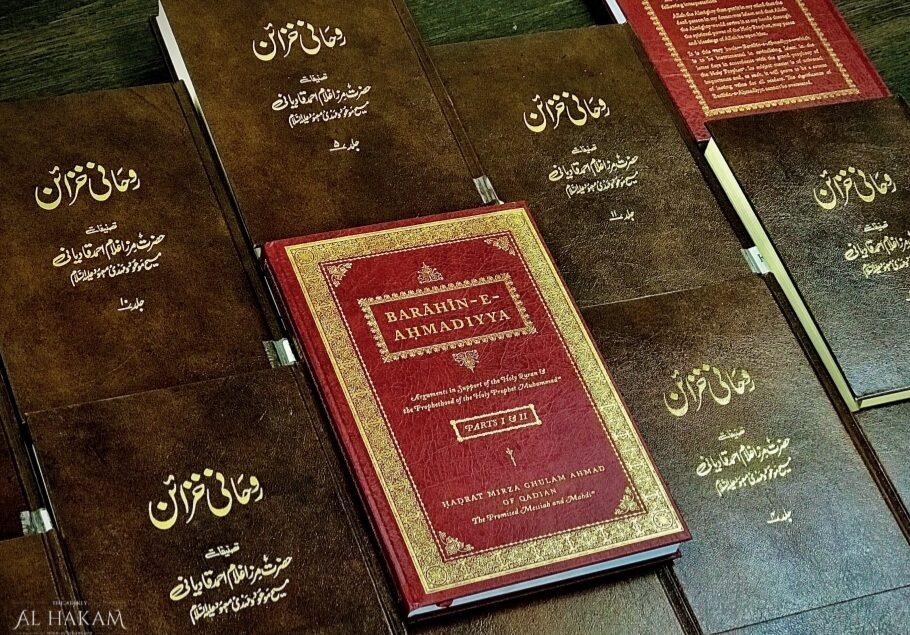
Many religious scriptures contain prophecies about the advent of a Messiah in the Latter Days. Similarly, the Holy Prophet Muhammadsa had prophesied about the advent of the Promised Messiah and Imam Mahdi, and narrated the Signs of that era as well.
It was certain that the awaited Messiah would have extraordinary qualities to compete with the satanic powers of the world, in order to defend Islam. This required him to be well versed in spiritual knowledge, and recipient of divine help from God Almighty.
The signs of the Latter Days have been described in Surah al-Takwir, and one of them is:
وَاِذَا الصُّحُفُ نُشِرَتۡ
“And when books are spread abroad.” (Surah al-Takwir, Ch.81: V.11)
Then, there is a hadith which describes the attributes of the Latter Days Messiah, and states:
وَيَضَعَ الْحَرْبَ، وَيَفِيضَ الْمَالُ حَتَّى لَا يقْبَلَهُ أَحَدٌ
“He will stop the [religious] wars and distribute wealth in such abundance that nobody will accept it.” (Sahih al-Bukhari, Kitab Ahadith al-Anbiya, Hadith 3448)
The above-mentioned verse and hadith indicated that in the Latter Days, there would be publications in abundance and by these means the Promised Messiah would prove the supremacy of Islam. It implied that the jihad of the sword would be prohibited and jihad by the pen would be needed. Moreover, the word ‘maal’ mentioned in the hadith did not mean material riches. Rather, it meant spiritual wealth. It meant that the awaited Messiah would disclose those spiritual secrets which were not seen for a long time, and thus, he would revive the beautiful teachings of Islam. In short, the Messiah would use the pen as his ‘weapon’.
In the thirteenth century after Hijrah, all religions were constantly opposing Islam, and the Muslims seemed to be unable to defend Islam. Many books were being written against Islam, and objections were being raised from all sides.
In light of the verse وَ اِذَا الصُّحُفُ نُشِرَتْ, it was clear that the time had come for the coming of the awaited Messiah, but the Muslims thought that they would defeat the anti-Islam rhetoric with Jihad of the sword, and they were not responding to the opponents in an appropriate way. Thus, the Muslims were being defeated in all fields. Hence, Islam was seen as a religion without any divine help and power (God forbid).
All the prophecies about the advent of the Promised Messiah and Imam Mahdi, were fulfilled with great glory in the person of Hazrat Mirza Ghulam Ahmadas of Qadian. He stated in a couplet:
وه خزائن جو ہزاروں سال سے مدفون تهے
اَب مَيں ديتا ہوں اگر كوئی مِلے اُميدوار
“The treasures that lay buried for thousands of years; Today I give them away if I find anyone who seeks them.” (Barahin-e-Ahmadiyya Part V [English], p. 209)
In this regard, he stated:
“God Almighty has appointed me so that I may reveal these hidden treasures to the world, and so that I may purify and cleanse the filth of those impure allegations that have been smeared upon these shining gems. The jealousy of God Almighty is vigorously roused at this time in order to clear and absolve the honour of the Holy Quran from the objections attributed to it by every malevolent enemy. Therefore, in the case that our opponents seek to attack Islam by the pen, and indeed they do, how foolish would it be for us to come prepared to engage in physical battle against them?” (Malfuzat [English], Vol. 1, p. 59)
While narrating a divine vision, the Promised Messiahas stated:
“I saw that I was standing on a pulpit in the city of London and was setting forth the truth of Islam in the English language, in a very well-reasoned address. Thereafter, I caught several birds who were sitting upon small trees and were of white colour and their bodies resembled the bodies of partridges.
“I interpreted this in the meaning that though I would not [be able to travel to that country], my writings will reach those people and many righteous English people will be attracted to the truth.” (Izala-e-Auham, Ruhani Khazain, Vol. 3, p. 377)
Huzooras stated at another place:
“Know for certain that in this age it is not the sword that is needed but the pen. Our opponents have spread doubts about Islam and have sought to attack the true religion sent by Allah Almighty through various sciences and strategies. I have thus been moved by God to enter this battlefield of science and academic advancement armed with a literary arsenal, and also to exhibit the spiritual valour of Islam and demonstrate the marvel of its inner strength. How could I have been capable to enter this field of battle? It is only due to the grace of Allah Almighty and His boundless beneficence that He desires to manifest the honour of His religion at the hands of a humble man like myself.” (Malfuzat [English], Vol. 1, p. 58)
He stated at another instance:
“Islam is a pure and flawless religion. However, it has been attacked in such a manner that there are hundreds of thousands of books written which are filled with vile abuse against the Holy Prophetsa. Some magazines are printed in the millions. If everything that has been written against Islam is gathered together in one place, it would form an enormous mountain.
“The case of the Muslims is that it seems as if they are lifeless and have become like corpses. In times like these, if God Almighty also remains silent, then one can only imagine what would be the outcome. One strike from God Almighty is far greater than even a thousand assaults of man and this one strike alone would be enough for His religion to triumph over others.” (Malfuzat, Vol. 8, pp. 174-175)
The Holy Prophetsa stated:
بَعَثَ اللهُ الْمَسِيحَ ابْنَ مَرْيَمَ فَيَنْزِلُ عِنْدَ الْمَنَارَةِ الْبَيْضَاءِ شَرْقِيّ دِمَشْقَ بَيْنَ مَهْرُودَتَيْنِ وَاضِعًا كَفَّيْهِ عَلَى أَجْنِحَةِ مَلَكَيْنِ
“Allah would send Jesus, son of Mary, and he will descend at the white minaret to the east of Damascus, wearing two garments lightly dyed with saffron and placing his hands on the wings of two angels.” (Sunan Abi Dawud, Kitab al-Malahim, Hadith 4321)
In this regard, the Promised Messiahas stated:
“The two angels symbolise the two supports from the unseen, upon which depends the incontrovertibly of his claim:
“1. God-given knowledge regarding incontrovertible evidence based on reason and record, that shall be vouchsafed to him without any effort and exertion on his part.
“2. Secondly, the incontrovertible argument through Signs which will be sent down by God without any human intervention.” (The Philosophy of Divine Revelation, p. 388)
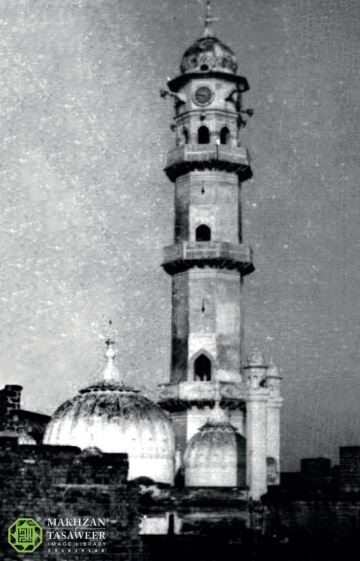
The Promised Messiahas wrote around 85 books which have been compiled in 23 volumes, titled Ruhani Khazain, whereas, his discourses are compiled as Malfuzat, and announcements as Majmu‘a Ishtiharat. The collection of his Urdu poetry is named Durr-e-Sameen, while his Persian poetry is also published under the name of Durr-e-Sameen Farsi. The poetry that he wrote prior to his claim is named Durr-e-Maknoon, also known as Kalam-e-Ahmad. His Arabic poems are published under the title Al-Qasa’id-ul-Ahmadiyya.
All of his writings and discourses are filled with the love of Allah and the Holy Prophetsa and prove the majesty of Islam.
The Promised Messiahas stated in a couplet:
صَفِ دشمن كو كيا ہم نے بحجت پامال
سيف كا كام قلم سے ہی دكهايا ہم نے
“We routed the ranks of foes with convincing proofs; The work of sword we accomplished with just the pen.”
In relation to the verse وَ اِذَا الصُّحُفُ نُشِرَت, Huzooras stated:
“The phrase, ‘When the books are spread abroad,’ refers to the means for publication like the printing press. As you see, Allah the Almighty has raised a nation that has invented the instruments for printing. [Look] how many printing presses are working in India and other countries. This is God’s act so that He may assist in my task and may spread my teachings and my books and convey to every nation the wisdom contained in my writings so that they may listen and be guided.” (Aina-e-Kamalat-e-Islam, Ruhani Khazain, Vol. 5, p. 473)
In verse 4 of Surah al-Jumuah, the words, وَاٰخَرِيۡنَ مِنۡهُمۡ لَمَّا يَلۡحَقُوۡا بِهِمۡ, indicate that the Latter Days Messiah – who was to be the shadow of the Holy Prophetsa – will recite unto his people Allah’s Signs, and purify them, and teach them the Book and wisdom. Therefore, the Promised Messiah’s writings and sayings are full of these four attributes.
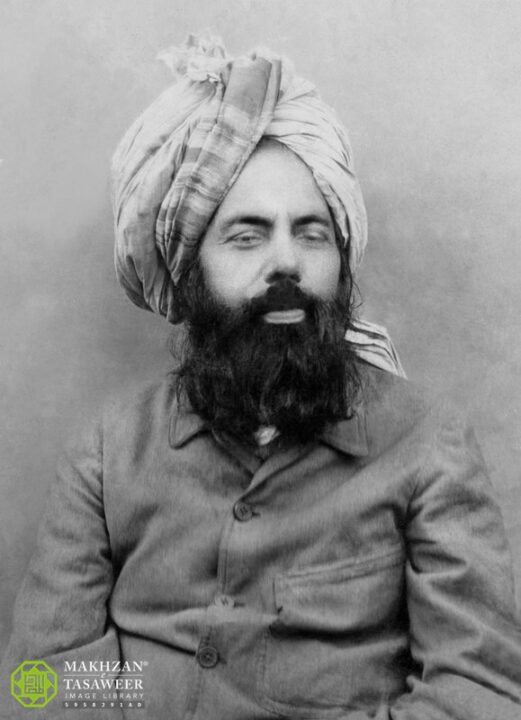
A renowned scholar of the Indian Subcontinent, Maulana Abul Kalam Azad, wrote an editorial in his newspaper Vakil of Amritsar, upon the demise of Hazrat Ahmadas. He stated:
“This man – the very pre-eminent personality – whose pen was a marvel and voice magic. He was a monument of great intellectual wonders; his insight was revolutionary and his voice was charged with the call of Judgement. His fingers moved the strings of reformation, and his two fists generated the thunderous lightning. The man who served as the epicentre of religious shock waves for thirty years, and awakened the sleeping souls of the world with his thunderous calls. […]
“Men who revolutionised the spiritual or intellectual world appear very seldom. But when such prides of the children of history do appear, they bring about a revolution in this world. The demise of Mirza Sahib, in spite of extreme differences over some of his claims and views, has made educated and enlightened Muslims realise that they have lost one of their pre-eminent personalities. […]
“His distinction of serving as an ever-victorious general against the opponents of Islam compels us to openly and sincerely wish that the majestic movement which dwarfed and destroyed our enemies for a long time may continue in the future.
“The literature that Mirza Sahib produced against the Christians and Aryas has been acclaimed widely and as such does not need any introduction. Even today, now that it has fulfilled its purpose, we have to sincerely acknowledge its influence and magnificence. Our hearts can never forget the time when Islam was totally encircled by hostile attacks and Muslims, who were entrusted by the Real Protector [God Almighty] with the duty to defend Islam in the visible and perceptible worlds, were leading a miserable life as a penalty for their own vices. They did nothing for the defence of Islam, nor were they capable of it.” (Tarikh-e-Ahmadiyyat, Vol. 2, pp. 560-561)
The Promised Messiahas stated:
“In short, this land [Indian Subcontinent] is a Dar-ul-Harb in our contest against the Christian clergy. Therefore, we must not sit idle. However, do remember that our war against them must be like in kind. We must go forth with the same form of weaponry that the Christian clergy have brought into the field of battle, and that weapon is the pen. It is for this very reason that Allah the Exalted has named my humble self the King of the Pen and has named my pen the Dhulfiqar of Ali. The secret at the heart of this is that the present era is not an age of war and battle, but an era of the pen. (Malfuzat [English], Vol. 1, p. 238)
Hazrat Naimatullah Walirh wrote a Persian poem describing the signs of the advent of the Promised Messiah and Mahdi. In one of his couplets, he stated:
یدِ بیضا کہ با او تابندہ
باز با ذوالفقار مے بینم
‘I see his hand shining like the white hand of Moses; And in his hand, I see the Dhulfiqar’.
While commenting on this couplet, Hazrat Ahmadas stated:
“[That is] In respect of incontrovertible arguments, his adroit hand flashes like a sword. Then I see him with the Dhulfiqar. There was a time when Hadrat Alira held the Dhulfiqar in his hand; but Allah, the Exalted, will bestow Dhulfiqar upon that Imam in such a manner that his luminous hand will accomplish that which in the past had been accomplished by Dhulfiqar. Thus his hand will be as if it was the Dhulfiqar of Alira that has reappeared.
“This is an indication that the said Imam will be Sultanul Qalam and his pen will serve as Dhulfiqar. This prediction is an exact translation of a revelation vouchsafed to me, which was published ten years ago in Brahin-e-Ahmadiyya. It reads: Kitabul Wali Dhulfiqar-e-Ali, which means that the book of this saint is the Dhulfiqar of Alira. Here the reference is to me, and, on account of this, in many visions, I have been called Ghazi and there are allusions to this in Brahin-e-Ahmadiyya and in other places.” (The Heavenly Sign, pp. 28-29)
On another occasion, Huzooras stated:
“I particularly experience God’s miraculous power when I put my pen to paper. Whenever I write something in Arabic or Urdu, I feel as if someone is instructing me from within. […] During the course of writing Arabic, hundreds of complete sentences descend upon my heart, either in the form of verbal revelation or in the form of a writing on a piece of paper which is shown to me by an angel. Some of these sentences are verses of the Holy Quran, or similar to them with minor modification.
“Sometimes I only find out later that a certain Arabic sentence that had been revealed to me by God was, in fact, present in a certain book. God, being the Lord of everything, has the authority to reveal to my heart a fine sentence from some book, or an exquisite verse from some book of poetry. […]
“God, in Whose hand is my life, is my witness that this is how He has been dealing with me. This is one of the signs pertaining to matters of the unseen that continue to be revealed to me in various forms.
“My God cares not if any phrase that is revealed to me happens to be present in some Arabic, Sanskrit or English book, because for me it is a matter of the unseen. For instance, God Almighty has related many episodes from the Torah in the Holy Quran, and has included them in the category of the unseen, because they were unseen for the Holy Prophetsa, though not for the Jews. Hence, this is why I challenge the whole world to compete with me in writing a miraculous exegesis of the Holy Quran in eloquent Arabic. Otherwise, what is a mere mortal man and what power does a son of Adam have to arrogantly challenge the whole world?” (Essence of Islam, Vol. 5, pp. 156-158, [Nuzul-ul-Masih, Ruhani Khazain, Vol. 18, pp. 435-436])
At another instance, Huzooras said:
“I tell you truly that those who were revived by the Messiahas [Jesus] are dead, but he who will drink from the cup that has been bestowed upon me will never die. If there is anyone else who can also utter the life-giving words that I speak and proclaim such wisdom as I do, then you are at liberty to conclude that I have not come from God Almighty. However, if this wisdom and understanding — which serves as the water of life for those whose hearts are dead — is not procurable from any other source, then you have no excuse for the crime of having rejected the fountain that has been opened from heaven. No one on earth can stop it.” (Izala-e-Auham, Ruhani Khazain, Vol. 3, p. 104)
At another instance, Huzooras said:
“I cannot write even a single letter if the help of God Almighty is not with me. I have seen many times while writing that there is a spirit of God that is manifesting itself, the pen gets tired but the enthusiasm inside [my heart] does not get tired. My heart feels that every single letter comes from God Almighty.” (Malfuzat [1988], Vol. 2, p. 483)
On 9 February 1906, the Promised Messiahas received the following revelation:
در كلامِ تو چيزے است كه شعراء رادراں دخلے نيست۔ كَلامٌ اُفصِحَت مِن لَّدُن رَبٍّ كَرِيمٍِ
“Your discourse has been made eloquent by the Benevolent Lord. There is something in that which you say, to which the poets have no access.” (The Philosophy of Divine Revelation, p. 123)
Barahin-e-Ahmadiyya was the first book written by the Promised Messiahas, in which he established the truth of Islam and also narrated several prophecies after receiving glad tidings from Allah the Almighty.
Even his staunch opponent, Maulvi Muhammad Hussain of Batala stated:
“In our view, this book [Barahin-e-Ahmadiyya], at this time and considering the present circumstances, is such that so far, the like of it cannot be found in [the history of] Islam. Nothing can be said of the future:
لَعَلَّ اللّٰهَ يُحۡدِثُ بَعۡدَ ذٰلِكَ اَمۡرًا
“[‘It may be that thereafter, Allah will bring something new to pass.’ (Surah al-Talaq, Ch.65: V.2)]
“The author [of the said book] has also been so persistent in the service of Islam, with his money, life, writings, speeches and personal actions that very few parallels can be drawn among Muslims.” (Ishaat-us-Sunnah, Vol. 7, Number 6, p. 169)
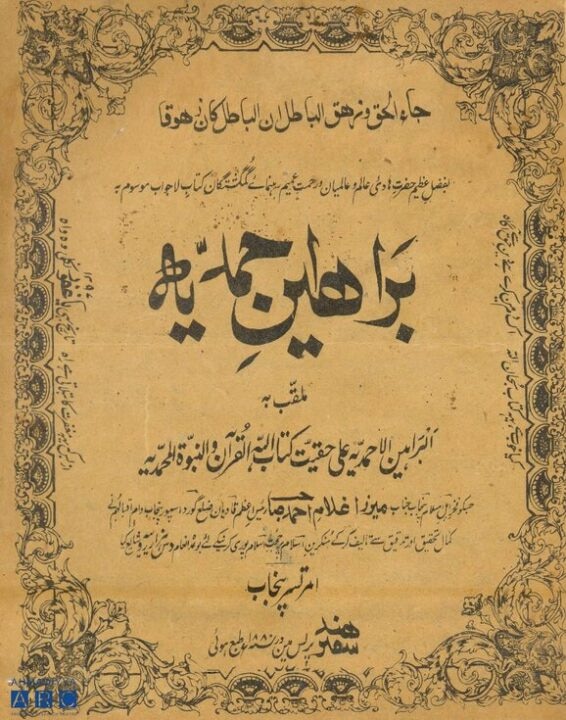
On many occasions, the Promised Messiahas has described the importance and need of his books. Some excerpts are presented below:
“At the present time, the swords of the pen are being wielded against us and the arrows of allegations are being rained upon us. It is our responsibility to ensure that we do not leave our faculties idle and we must sharpen the spears of our pens for the sake of God’s pure religion and to prove the truthfulness of the prophethood of God’s Chosen Messenger, peace and blessings of Allah be upon him.” (Malfuzat [English], Vol. 1, p. 237)
“It is important for all members [of the Jamaat] to read my books at least once, because knowledge is power, and power produces courage. One who does not have knowledge, gets surprised at a question from the opponent.” (Malfuzat [1988], Vol. 4, p. 361)
“Islam is being attacked by the pen, and thus, it is necessary to respond to [those attacks] by the pen. […] Look at the disbelievers, as to what kinds of efforts they are making against Islam, they are not preparing armies, rather they are publishing various books and magazines. Thus, it is our duty to pick up our pen in response, and defend against their attacks through magazines and books.” (Ibid., pp. 372-373)
“The Christian clergy publish books against Islam with all sorts of deceptions and slander. How can Islam be spread unless the Holy Prophet, peace and blessings of Allah be upon him, is proven to be pure from these evil words? […] We must help [the cause of] Islam. For instance, I have mentioned that a book should be written for the Japanese people, and an eloquent Japanese be given 1,000 rupees for translating it [into the Japanese language], and then ten thousand copies be printed and spread in Japan.” (Ibid., Footnote)
“Our friends should read Haqiqatul Wahi from beginning to end with great attention — in fact, they should memorise it. No maulvi will be able to stand before them because all the necessary matters have been elucidated in it and replies have been given to the objections.” (Malfuzat [1988], Vol. 5. p. 235)
“In my literary works for the itmam-e-hujjat [completion of proof], I have written around 70 to 75 detailed books, and each of them is so comprehensive that it is impossible for a seeker of truth and a researcher to not gain enough resource for distinguishing the right and wrong, after reading these [books] carefully.” (Ibid., p. 578)
“We need such men who can do something, not just verbally, but practically. Verbal claims of knowledge are useless. They should be completely free from arrogance and pride, and they should attain a higher level of knowledge by staying in my company or at least by reading my books frequently.” (Ibid., p. 682)
“And he who does not listen to the words of God’s Appointed One and Messenger attentively and does not read his writings carefully, has also partaken of arrogance. So, endeavour and let there be no arrogance in you, so that you may not perish and be saved along with all of your family.” (Nuzul-ul-Masih, Ruhani Khazain, Vol. 18, p. 403)
In regards to this excerpt, Hazrat Khalifatul Masih Vaa stated:
“This statement of the Promised Messiahas means that those who only remain occupied with worldly books and sciences and do not pay attention to religious books and knowledge have a kind of arrogance in them because they consider worldly knowledge to be sufficient. However, acquiring religious knowledge is very important for man’s deliverance. And religious knowledge comes from the study of religious books.” (Al Hakam, 29 October 2021, Issue 189, p. 6)
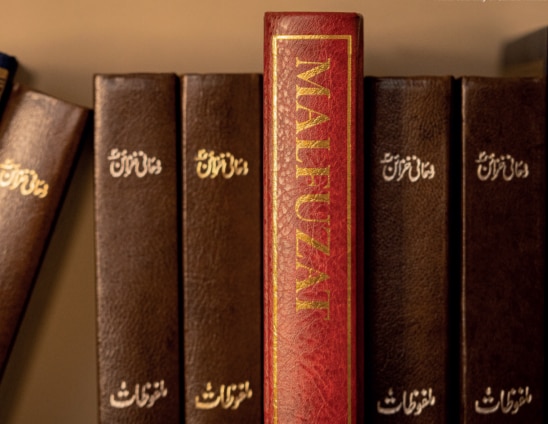
Guidance of Khulafa-e-Ahmadiyyat
On several occasions, Khulafa of Ahmadiyyat have spoken about the importance and blessings of the Promised Messiah’s writings and advised members of the Jamaat to pay attention towards reading his books. Some excerpts are presented below:
Excerpts of Hazrat Khalifatul Masih Ira
“Allah the Almighty had granted him [the Promised Messiahas] such knowledge that the Indian and Arab scholars were helpless in response to his Arabic books. He had complete trust in dua [prayer], and through dua, God had taught him all the disciplines [ulum].” (Hayat-e-Nur, p. 579)
While commenting on a revelation of the Promised Messiahas اِنَّا اَنْزَلْنَاهُ قَرِيْبًا مِّنَ الْقَادِيَانِ (Tadhkirah [English], p. 93), Huzoorra said:
“Every insightful person can observe that thousands of Quranic insights [ma’arif] have been published from Qadian to the whole world since the beginning of Barahin-e-Ahmadiyya’s publication […] The truthfulness of the Holy Quran and hujjat [proof] of [the Holy Prophet] Muhammad’ssa prophethood has been completed upon the followers of all other religions, whether Jews or Christians, Arya or Sanatan Dharam, Sikh or Naturalists […]
“If this revelation was not from Allah, then how could these fountains of Quranic insights [ma’arif] and Islamic truths be spread from such a small town to the whole world; whose branches have expanded to the whole world, including America, Europe (Germany, France), Russia, Japan etc. Look at the institutions of The Review of Religions, Al Hakam, Badr, Talim-ul-Islam, and Tash-heezul-Azhan etc.” (Khutbat-e-Nur, p. 233)
“I want you to love Allah the Almighty, His angels, His prophets, and His messengers, and not to disrespect anyone. Allah the Almighty has granted you a great blessing, as the advent of Hazrat Sahib [the Promised Messiahas] is not an ordinary happening […] Propagate the books of Hazrat Sahib.” (Khutbat-e-Nur, p. 559)
Excerpts of Hazrat Khalifatul Masih IIra
“Read the books of Hazrat Sahib [the Promised Messiahas], and remember that Hazrat Sahib’s books are a commentary of the Quran.” (Islaah-e-Nafs, Anwar-ul-Ulum, Vol. 5, p. 447)
“Angels may descend on a person who reads the books written by someone on whom the angels used to descend. Therefore, angels would descend on anyone who would read Hazrat Sahib’s [the Promised Messiahas] books. It is a distinctive feature that [new] aspects and insights open up while reading Hazrat Sahib’s books, and whenever one reads them, special points and blessings are bestowed.
“Barahin-e-Ahmadiyya has been written by the sheer grace of Allah the Almighty. About this [book], I have noticed that whenever I started reading it, I could not read even ten pages [continuously], because so many new matters and points of knowledge begin to open up, that the mind becomes occupied with them.
“Thus, Hazrat Sahib’s books have been blessed immensely [by Allah the Almighty], and reading them is also a means of getting blessings from angels, and through them, new avenues of knowledge [ulum] are opened. If you read any other book, you will understand as much subject as mentioned in those words, but reading the books of Hazrat Sahibas opens up a lot of subject matters.” (Malaikatullah, Anwar-ul-Ulum, Vol. 5, p. 560)
“The Promised Messiahas came from God Almighty as a buruz [spiritual projection] of the Holy Prophet Muhammadsa. Therefore, each and every word, written by his pen, is more precious than all of the worldly books and writings. If at any time, a question arose whether to preserve a single line written by the Promised Messiahas or the books of all the authors of the Jamaat, I would say that I would exert my utmost effort to preserve this single line [written by the Promised Messiahas] and would accept to burn all these books [of scholars of the Jamaat] with kerosene oil. What importance do our books have? These are all interpretations of what the Promised Messiahas has written.” (Khitabat-e-Shura, Vol. 1, p. 148)
“The books of the Promised Messiahas are based on experience and are dominant over observations. A common preacher says that such and such is written in the Holy Quran and ahadith, but the prophets of God Almighty do not say that such and such is written at a certain place, but they say that such and such is written on their heart and tongues. Their sermons are their biographies, so reading their books does not have a sermon effect on someone, but an observational effect. Just as dua is the essence of prayer, similarly, advice [naseehat] is the essence of the prophets’ books, which is found in the words of God Almighty and His prophets.” (Khutbat-e-Mahmud, Vol. 11, pp. 283-284)
“The personage of the Promised Messiahas has manifested so many blessings in this world, and one of the greatest blessings is his style of writing. […] The Promised Messiah’sas writings, in addition to being powerful, remain serious and dignified as well. […] Our writings need to be in accordance with the Promised Messiah’sas style [of writing], so that this tradition continues in the future in such a way that it can also be considered a reminder of [the Promised Messiahas]. […] Thus, the authors of our newspapers, magazines and books are required to study the Promised Messiah’sas writings in such a manner that it enables them to follow his style of writing. They should not attempt to follow that literature, which comprises an aspect of ridicule and mockery. In this way, they will be able to render twofold services: first, the propagation of the arguments presented by the Promised Messiahas, and second, the continuation of his style of writing. […] The Promised Messiah’s [style of] writing posesses such a power of attraction that following his style of writing creates immense power and attraction in one’s writing in comparison to others. […] The example of the flow of the Promised Messiah’sas writings, is like water flowing down the mountains; apparently, its direction is not known, but it makes its own way. Divine Majesty is manifested through the writings of the Promised Messiahas, and they are free of any kind of artificiality. […] All other writings are mere paintings, whereas, the Promised Messiah’sas writings are a natural scene.” (Khutbat-e-Mahmud, Vol. 13, pp. 218-221)
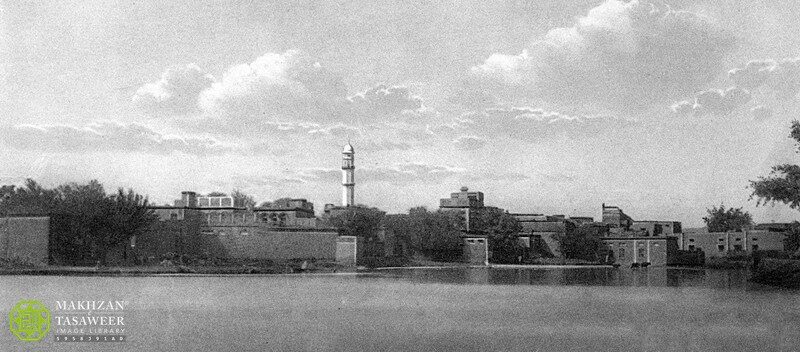
Excerpts of Hazrat Khalifatul Masih IIIrh
“The Promised Messiahas, in his prose and poems, in his speeches and discourses and in his books, in fact, in every way, has always emphasised the point that the spirit of Islam lies in taqwa [righteousness]. The Promised Messiahas stated in his couplet:
سنو ہے حاصل اسلام تقویٰ
خدا كا عشق مے اور جام تقویٰ
‘Listen! The essence of Islam is taqwa! Love of God is the wine and taqwa is the goblet.’” (Friday Sermon, 16 December 1966)
“Read the books of the Promised Messiahas frequently, especially Durr-e-Sameen.” (Al Fazl, 11 October 1970)
“Every [Ahmadi] household should have the books of the Promised Messiahas which they should study and teach to the children.” (Al Fazl, 29 October 1977)
“The interpretation of the Holy Quran which meets the needs of this age, is found in the books of the Promised Messiahas. The Promised Messiah’s books and the disciplines [ulum] which they comprise are the life and spirit of every Ahmadi. If you are unfamiliar with those books or the disciplines described within – then although Ahmadiyyat will continue to spread and it will be difficult to eradicate it – you will become like a lifeless body.” (Mash’al-e-Raah, Vol. 2, p. 44)
“I will urge you time and time again to get in the habit of reading the books of the Promised Messiahas. If you start reading three pages daily, you will get in the habit of reading it and it would not have any [negative] effect on your work at all, whether you are studying or employed. Instead, this reading will have a good effect on them. If someone is a student, then reading these books would create enlightenment in their mind and a nur [divine light] will be instilled. Therefore, they will easily understand other subjects like Chemistry and English etc. and they will gain good marks in exams. And if someone is employed, then efficiency will be created in their work.” (Ibid., p. 45)
“The Promised Messiahas has presented to us the Islamic teaching in a beautiful and amazing manner, and with great detail. But it is our duty to draw the attention of those youngsters who are not interested in this treasure, and tell them that ‘this is the teaching which he has given, this is the interpretation of the Holy Quran which he has narrated, these are the manifestations of the beauty and benevolence of the Holy Prophetsa which are found in his books, and these are the attributes of Allah the Almighty on which he has shed light.’” (Ibid, pp. 207-208)
“Let me tell you one thing and I say from my experience and according to my insight that the Quranic commentary given to us by the Promised Messiahas, is so great that pick up any of his books, large or small, and read it a hundred times, and every time you would find new meanings in it. This is a commentary of such a kind. His books are not like ordinary books, rather they are inspired by God. This interpretation of the Holy Quran was taught to the Promised Messiahas by God as a result of the Holy Power [quwwat-e-qudsia] of the Holy Prophet Muhammadsa, and by sacrificing himself in a state of fana fil rasul, and thus God became his teacher Himself.” (Ibid., p. 443)
“If one takes a single sentence of Huzoor’s writings, the subject matter of that one sentence would not end even if they spend their whole life [pondering over]. Once, I picked up a sentence from a book of the Promised Messiahas and delivered five or seven Friday sermons on that one sentence. That much subject matter was filled within that [one sentence].” (Ibid., p. 471)
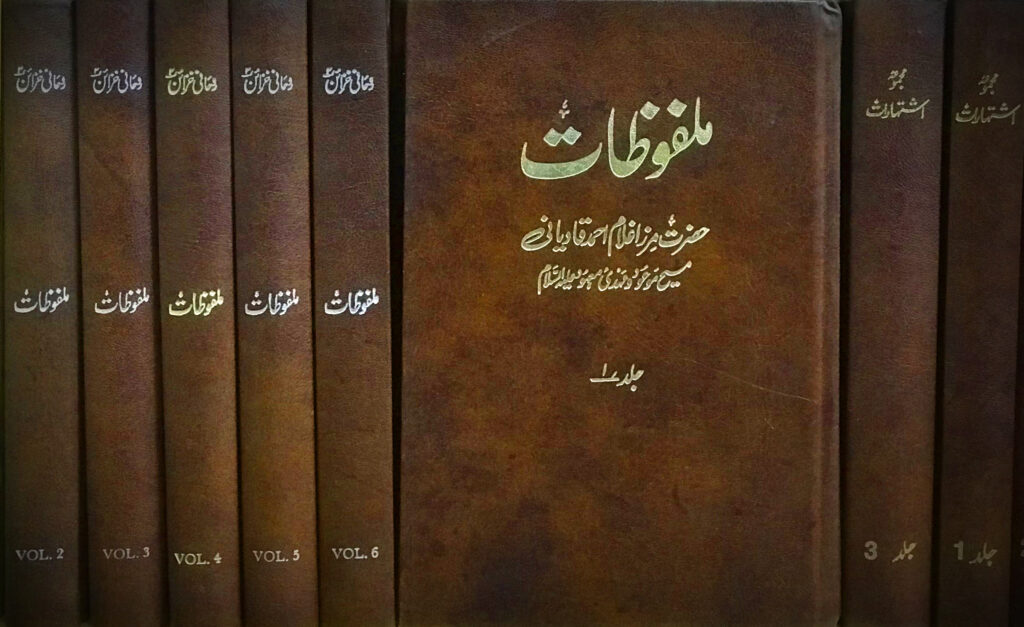
Excerpts of Hazrat Khalifatul Masih IVrh
“May Allah the Almighty shower countless blessings upon the Promised Messiahas who closed all the paths of arrogance and opened the path of humility. Each of his couplets, each of his lines of poetry, each and every word is full of truth. And the reality is that the poetry of the Promised Messiahas is in itself proof of his truthfulness. If a person of a pious nature listens to this poetry, it is impossible for him not to testify to the truthfulness of its author.
“Amazingly pure and pious emotions. The soul becomes intrigued while hearing this poetry, which is immersed in love [of Allah the Almighty and the Holy Prophetsa].
“While the poetry was being recited, I was thinking of those Ahmadi youths who say, ‘How should we do da‘wat ilallah [calling unto Allah]? We cannot remember the arguments. We do not have the capability to debate. We do not know Arabic. We do not know how to debate.’ I thought to myself, what more do they need to remember than remembering the poetry of the Promised Messiahas, reciting it like darweshes from one town to another and preaching it and informing the world that he has come whose coming is linked with your salvation.
“Such effective poetry, such pure poetry, such wise poetry; poetry which consists of the praise of Allah the Almighty; poetry, about which one must say:
آدمی زاد تو كيا چيز فرشتے بهی تمام
مدح ميں تيری وه گاتے ہيں جو گايا ہم نے
‘Not only Human beings, but all of the angels sing in your praise what I have sung.’
“The fact of the matter is that when the Promised Messiahas would have uttered this couplet, surely, the angels in heaven must have also recited this couplet along with him. They must have been reciting all the praises of Allah the Almighty along with him, what he expressed in love of Allah the Almighty.” (Mash‘al-e-Rah, Vol. 3, pp. 43-44)
“Each and every word [of the Promised Messiahas] makes us ecstatic, inspires our souls and kindles new life in us.” (Friday Sermon, 12 April 1985, Khutbat-e-Tahir, Vol. 4, p. 336)
“Just read through the words of the Promised Messiahas and see what God is, what angels are, what the heavenly books are, and what the prophets are. But the ideas put forward by the opponents of Ahmadiyyat cannot even come close to the ones that the Promised Messiahas has presented to us in his pure words, derived from the Holy Quran and the sunnah of the Holy Prophetsa.” (Friday Sermon 3 May 1985, Khutbat-e-Tahir, Vol. 4, p. 401)
“The excerpts of the Promised Messiahas are so impactful that in this era, there is no better way for tarbiyat of the Jamaat than to read out those [excerpts]. The Promised Messiah’s words originate from the depth of heart and instil into the depth of heart, and are the sayings of such an experienced person whose words do not have even the slightest amount of untruth or pretence. Whatever he says, is the truth. And what could have more impact on a heart than the words uttered by such a person?” (Al Fazl, 19 April 1998)

Excerpts of Hazrat Khalifatul Masih Vaa
“One should benefit from the commentary [of the Holy Quran] and theology of the Promised Messiahas. If one wishes to understand the Holy Quran or ahadith, they should pay attention to [reading] the Promised Messiah’s books. This is a great blessing for those who know how to read Urdu as the majority of the books are in Urdu, a few are also in Arabic. Then for those who are illiterate, there is an arrangement of duroos in the mosques. One should attend and listen to those duroos.
“Moreover, one should benefit from the MTA. And MTA administration should also present such programmes for different countries as much as possible, in which the translation of the Promised Messiah’s excerpts be presented in their [respective] languages. Wherever the translations [of Huzoor’s excerpts] have been prepared, and are satisfactory, they can be presented anyway. In the same way, Urdu programmes should be prepared by the Urdu-speaking people or countries, so that the world may see the points of spiritual insight [ma‘rifat] of the Promised Messiah’s theology, and may it be a source of guidance for us [Ahmadis] and others [non-Ahmadis] as well.” (Friday Sermon, 11 June 2004, Khutbat-e-Masroor, Vol. 2, pp. 401-402)
“In order to acquire the Quranic and religious knowledge, first of all, we need to read and pay attention towards the priceless treasures provided by the Promised Messiahas. Because he has shown us the ways for our thinking, through which we can enhance our Quranic and religious knowledge, and then with this Quranic knowledge the avenues to worldly knowledge and research are also opened.
“Therefore, the youth of the Jamaat ought to be interested in reading and benefiting from the Promised Messiah’s books, along with their worldly education. Moreover, if the researchers and many students who are doing research on different topics would combine this religious and Quranic knowledge with their secular knowledge, new paths will also be paved for them, and opportunities will also be available to work from different aspects, which they might not learn from their worldly professors. […]
“The older people should not think that as they get older they can no longer acquire knowledge. They also need to pay attention to this, [and need to] read the Promised Messiah’s books.” (Friday Sermon, 18 June 2004, Khutbat-e-Masroor, Vol. 2, pp. 407-408)
“Every Ahmadi needs to ensure that they, along with their wives and children, pay attention towards recitation of the Holy Quran. Moreover, they should read the translation [of the Holy Quran] and commentary by the Promised Messiahas. Although this commentary is not in the form of a [full] commentary, a compilation work has been done by taking excerpts from [the Promised Messiah’s] books, speeches, and Malfuzat, and this is a great treasure of knowledge.” (Friday Sermon, 24 September 2004, Khutbat-e-Masroor, Vol. 2, p. 687)
“There is a narration from Siratul Mahdi which reads that ‘the Promised Messiahas used to say that one who did not read his books at least three times had a kind of arrogance in him.’ (Siratul Mahdi [Urdu], Vol. 1, p. 365, Narration No. 410)
“[Meaning] that reading only worldly books while leaving aside religious books and acquiring only worldly knowledge while neglecting religious knowledge reflects the existence of arrogance in a person. Therefore, every Ahmadi ought to take maximum benefit from these spiritual treasures.” (Al Hakam, 29 October 2021, Issue 189, p. 6)
In the foreword of the new edition of Ruhani Khazain, Huzooraa stated:
“It is clear from the Holy Quran and the sayings of the Noble Prophet, peace and blessings of Allah be upon him, that this is the age in which the means of the propagation and dissemination of Islam to the corners of the earth had been decreed by the Powerful and Omnipotent God.
“For this reason, scientific discoveries took place with such rapidity and in such large numbers that man would be astonished and, effectively, say:
وَ قَالَ الۡاِنۡسَانُ مَا لَهَا
“[And man says, ‘What is the matter with her (the earth)?]
“It is this age, about which it was foretold:
وَ اِذَا الصُّحُفُ نُشِرَتۡ
“[And when books are spread abroad] and thereby informed us that such inventions would take place that would flourish the spread of books and journals.” […]
“It is our good fortune that we have been able to accept the Imam Mahdi and Messiah of Muhammadsa and thus, inherited these spiritual treasures [Ruhani Khazain]. Accordingly, we should study these blessed writings so that our hearts, minds and souls become enlightened by means of this, something which is capable of eliminating the darkness of Dajjal [the antichrist].
“May Allah enable us to beautify our lives and the lives of our progeny through these blessed writings and may we light the candles of peace and tranquillity within our hearts, homes and surroundings. May the love of God and His Prophetsa penetrate our hearts in such a manner that we are able to carry on igniting the flame of love and compassion for mankind throughout the world. May Allah help us in this task. Amin.”
In short, the Promised Messiahas disclosed all those spiritual treasures to this world that had been hidden for a long time. Now, it is our responsibility to benefit from these treasures.


Very Inspiring
InshaAllah will make efforts to read Promised Messiah’s books
Indeed, our beloved Hazrat Masih-e-Maud (as) left these treasures for us and whole world. Jazak Allah for your all the hard work to highlight these precious marvels.
Alhamdulillah I am enlightened and had the opportunity to share this with Jamaat members on the occasion of Masih-e-Maud Day. Jazak-Allah